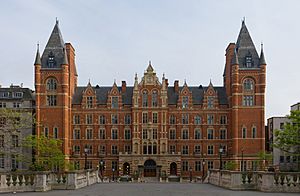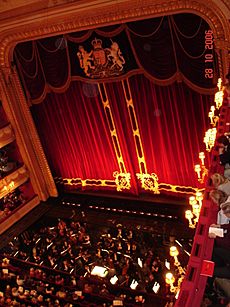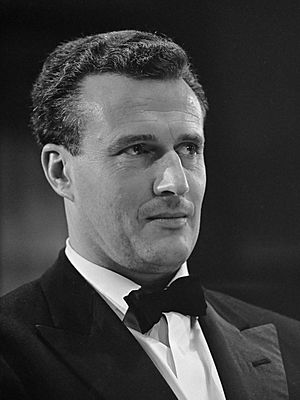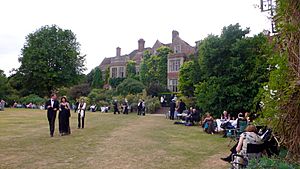Colin Davis facts for kids
Sir Colin Rex Davis (born September 25, 1927 – died April 14, 2013) was a famous English conductor. He was especially known for his long connection with the London Symphony Orchestra, which he first conducted in 1959. He was great at conducting many different types of music. Some of the composers he was best known for were Mozart, Berlioz, Elgar, and Sibelius.
Davis first studied to be a clarinet player. But he really wanted to become a conductor. After working hard as a freelance conductor for several years, he got important jobs with orchestras. These included the BBC Scottish Orchestra and the BBC Symphony Orchestra. He also led the music at places like Sadler's Wells Opera and the Royal Opera House. He was the main conductor at the Royal Opera House for over fifteen years. He also conducted as a guest with many other famous orchestras around the world.
Besides conducting, Davis also taught music. He held teaching jobs at the Royal Academy of Music in London. He started making recordings in 1958. Over the next five decades, he made many, many recordings. Many of these were for Philips Records and the London Symphony Orchestra's own label.
Contents
Early Life and Musical Beginnings
Colin Davis was born in Weybridge, Surrey, England. He was the fifth of seven children in his family. His family loved music, so he grew up surrounded by it.

With help from his great-uncle, Davis went to Christ's Hospital school. Then he won a scholarship to the Royal College of Music in London. There, he studied the clarinet. But he became more interested in conducting music. However, he couldn't join the conducting class because he couldn't play the piano.
After finishing college and his required military service, Davis played the clarinet in the band of the Life Guards. While stationed in Windsor, he often went to concerts in London. In 1949, he started working as a freelance musician. This meant he worked for himself, taking different jobs. His first conducting job was with the Kalmar Orchestra, which he helped start. He also conducted an opera called Don Giovanni. Early in his career, he sometimes played the clarinet in orchestras too. He also taught music and gave lectures. During this time, he discovered his love for the music of Berlioz.
Rising to Fame with the BBC and Sadler's Wells
Davis's big break came in 1957. After trying three times, he got a job as an assistant conductor for the BBC Scottish Orchestra. The main conductor usually chose the well-known pieces. This left Davis to conduct newer and less common works, including those by Berlioz. By 1959, he had become so good that a famous music critic wrote that Davis was one of the best young conductors in Britain.
Davis became widely known in 1959 when he stepped in for an ill conductor, Otto Klemperer. He conducted Don Giovanni at the Royal Festival Hall. A year later, another famous conductor, Sir Thomas Beecham, asked him to help prepare The Magic Flute at Glyndebourne. Beecham became ill, and Davis conducted the opera himself. After these performances, critics praised his conducting of Mozart's music.
In 1960, Davis conducted for the first time at the famous Proms concerts. In the same year, he became the chief conductor of Sadler's Wells Opera. By 1961, he was the musical director there. He built up a large collection of operas he could conduct, performing in London and on tour. He was especially good at operas like Idomeneo and The Rake's Progress. He also introduced new operas to the British public. He worked hard to make sure the drama of the operas was as important as the music. Davis was known for being very passionate in rehearsals. He left Sadler's Wells in 1965.
After leaving Sadler's Wells, Davis became the chief conductor of the BBC Symphony Orchestra (BBC SO) in 1967. He was encouraged to try out new and modern music in his programs. He stayed with the BBC SO until 1971. After that, he was their chief guest conductor for several years.
Leading at Covent Garden
In 1970, Sir David Webster, who ran the Royal Opera at Covent Garden, asked Davis to become the main conductor there. This was a very important job. Davis felt it was his duty to take it. The idea was that Davis and a stage director would work together as equal partners. They had some early successes, but the stage director left. This left Davis, along with the General Administrator, to run the Royal Opera.

Some audience members were not happy in Davis's early months at Covent Garden. But he had many successes. These included Berlioz's huge opera Les Troyens and Mozart's main operas. Critics also said he was excellent at conducting music by Britten and Stravinsky. Davis conducted over 30 operas during his fifteen years there. He also conducted many modern and less common operas. He preferred to work with stage directors who respected the original story of the opera.
While at Covent Garden, Davis also returned to the BBC Symphony Orchestra as a guest conductor. He also held the same job with the Boston Symphony Orchestra. In 1977, he became the first English conductor to perform at the famous Bayreuth Festival in Germany. He conducted Tannhäuser there, and it was very successful. He also performed for the first time at the Metropolitan Opera in New York City in 1967.
Working with Bavarian Radio and London Symphony Orchestras
From 1983 to 1993, Davis was the chief conductor of the Bavarian Radio Symphony Orchestra in Germany. With them, he performed many symphonies by composers like Bruckner and Mahler. He was also offered important jobs with the Cleveland Orchestra and the New York Philharmonic, but he turned them down. He was also an honorary conductor for the Dresden Staatskapelle, a very old orchestra. The musicians there even gave him the nickname "Der Sir."
In 1995, Davis became the main conductor of the London Symphony Orchestra (LSO). This was a big moment, as he had a long history with them. He first conducted the LSO in 1959. In 1964, he led the orchestra on its first world tour. He became their principal guest conductor in 1975. Davis was the longest-serving main conductor in the LSO's history, from 1995 to 2006. After that, they made him their President, a very special honor. In 2009, 50 years after his first LSO performance, a special concert was held to celebrate him.
During his time with the LSO, Davis conducted many series of works by composers like Sibelius, Berlioz, Mozart, and Elgar. He also conducted the first performance of Tippett's last major work, The Rose Lake. His partnership with the LSO was considered one of the most important of its time.
Teaching and Recordings
Sir Colin Davis was also dedicated to teaching. He was the president of a music school in Dresden, Germany. He also held a special teaching position at the Royal Academy of Music in London. The head of the Academy said that Davis was incredibly generous with his time. He inspired a whole generation of young musicians.
Davis made over 300 recordings. His first record was in 1958. He made many recordings for Philips Records. These included many symphonies and operas. He recorded all of Berlioz's operas, which won awards. His 1966 recording of Handel's Messiah was very important because it changed how people performed the piece. He also recorded Beethoven's symphonies, which were highly praised.
He also made many recordings with the Boston Symphony Orchestra. Later, he recorded complete symphony sets for RCA Victor, including those by Sibelius and Brahms.
When Davis was the main conductor of the LSO, the orchestra started its own record label, LSO Live. He made many recordings for this label. These included operas like Beethoven's Fidelio and Verdi's Falstaff. He also recorded many works by Berlioz, Britten, Elgar, and Sibelius.
Awards and Personal Life
Sir Colin Davis received many honors and awards. He was made a Commander of the Order of the British Empire (CBE) in 1965. He was knighted in 1980, which means he became "Sir Colin Davis." In 2001, he was made a Companion of Honour. He also received many international awards from countries like Italy, Germany, and France. In 1996, he was even named "Pipe Smoker of the Year"! He won a Grammy Award in 2006 for his recording of Verdi's Falstaff.
In 1949, Davis married soprano April Cantelo, and they had two children. Their marriage ended in 1964. Later that year, Davis married Ashraf Naini, also known as Shamsi. They had five children together. One of their children, Joseph Wolfe, also became a conductor. He chose a different last name to create his own musical identity.
Shamsi, his wife, passed away in June 2010. At that time, Davis was conducting Mozart's The Marriage of Figaro. He continued to perform just days later. When asked how he found the strength, he said it came from the music, especially Mozart's, which he called "life itself."
After his wife's death, Davis's health declined. He fell from the stage in 2011 and had to cancel many performances. His last concert in France was in June 2012. His last concert with the LSO was also in June 2012, performing Berlioz's Grande Messe des morts. Sir Colin Davis passed away in London on April 14, 2013, at the age of 85. Many people in the music world expressed their sadness and gratitude for his contributions.
|
See also
 In Spanish: Colin Davis para niños
In Spanish: Colin Davis para niños
 | Toni Morrison |
 | Barack Obama |
 | Martin Luther King Jr. |
 | Ralph Bunche |



